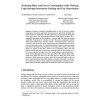Free Online Productivity Tools
i2Speak
i2Symbol
i2OCR
iTex2Img
iWeb2Print
iWeb2Shot
i2Type
iPdf2Split
iPdf2Merge
i2Bopomofo
i2Arabic
i2Style
i2Image
i2PDF
iLatex2Rtf
Sci2ools
PACS
2004
Springer
2004
Springer
Reducing Delay and Power Consumption of the Wakeup Logic Through Instruction Packing and Tag Memoization
Dynamic instruction scheduling logic is one of the most critical components of modern superscalar microprocessors, both from the delay and power dissipation standpoints. The delay and energy requirement of driving the result tags across the associatively-addressed issue queue accounts for a significant percentage of the scheduler’s overhead and also limits the design scalability. We propose two schemes to reduce the power consumption and the delays of the wakeup logic. Our first scheme – instruction packing – shares the associative part of an issue queue entry between two instructions, each with at most one non-ready source. As a result, the number of entries in the issue queue (and, hence, the length of the tag buses) can be reduced by a factor of two with almost no impact on the IPCs, because most instructions either enter the pipeline with at least one of their source operands ready, or do not make use of two source registers to begin with. Our second scheme – tag memoizatio...
| Added | 02 Jul 2010 |
| Updated | 02 Jul 2010 |
| Type | Conference |
| Year | 2004 |
| Where | PACS |
| Authors | Joseph J. Sharkey, Dmitry Ponomarev, Kanad Ghose, Oguz Ergin |
Comments (0)

